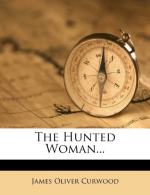“Everything may happen to-day, Johnny. I figger we’ll reach the end by sundown. An’ what don’t happen there may happen along the trail. Keep a rifle-shot behind with Joanne. If there’s unexpected shooting, we want what you might call a reserve force in the rear. I figger I can see danger, if there is any, an’ I can do it best alone.”
Aldous knew that in these last hours Donald MacDonald’s judgment must be final, and he made no objection to an arrangement which seemed to place the old hunter under a more hazardous risk than his own. And he realized fully that these were the last hours. For the first time he had seen MacDonald fill his pockets with the finger-long cartridges for his rifle, and he had noted how carefully he had looked at the breech of that rifle. Without questioning, he had followed the mountaineer’s example. There were fifty spare cartridges in his own pockets. His .303 was freshly cleaned and oiled. He had tested the mechanism of his automatic. MacDonald had watched him, and both understood what such preparations meant as they set out on this last day’s journey into the North. They had not kept from Joanne the fact that they would reach the end before night, and as they rode the prescribed distance behind the old hunter Aldous wondered how much she guessed, and what she knew. They had given her to understand that they were beating out the rival party, but he believed that in spite of all their efforts there was in Joanne’s mind a comprehension which she did not reveal in voice or look. To-day she was no different than yesterday, or the day before, except that her cheeks were not so deeply flushed, and there was an uneasy questing in her eyes. He believed that she sensed the nearness of tragedy, that she was conscious of what they were now trying to hide from her, and that she did not speak because she knew that he and MacDonald did not want her to know. His heart throbbed with pride. Her courage inspired him. And he noticed that she rode closer to him—always at his side through that day.
Early in the afternoon MacDonald stopped on the crest of a swell in the valley and waited for them. When they came up he was facing the north. He did not look at them. For a few moments he did not speak. His hat was pulled low, and his beard was twitching.
They looked ahead. At their feet the valley broadened until it was a mile in width. Half a mile away a band of caribou were running for the cover of a parklike clump of timber. MacDonald did not seem to notice them. He was still looking steadily, and he was gazing at a mountain. It was a tremendous mountain, a terrible-looking, ugly mountain, perhaps three miles away. Aldous had never seen another like it. Its two huge shoulders were of almost ebon blackness, and glistened in the sunlight as if smeared with oil. Between those two shoulders rose a cathedral-like spire of rock and snow that seemed to tip the white fleece of the clouds.




